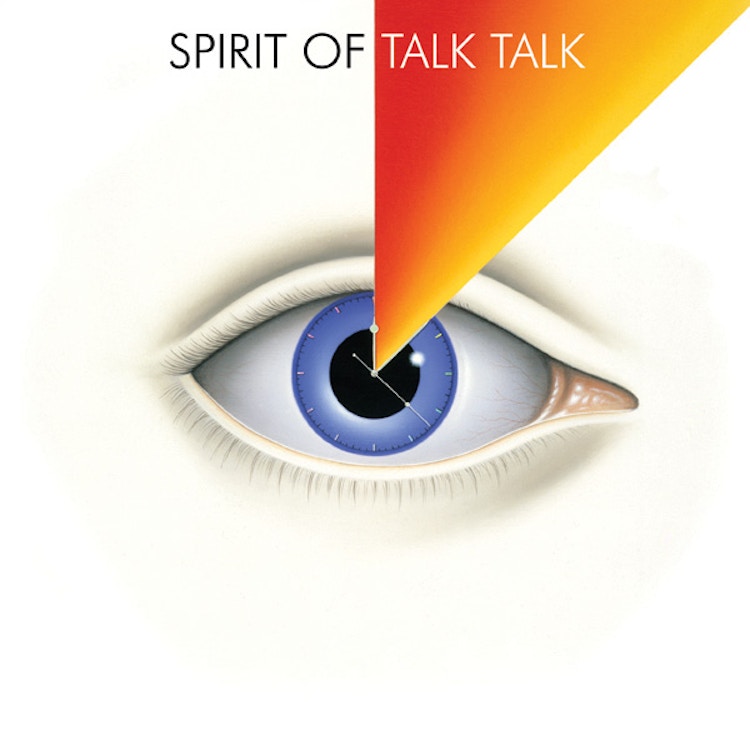"Spirit of Talk Talk"

Next month, the first book to tackle the history and influence of Talk Talk will be published: Spirit of Talk Talk will feature rare photographs, record sleeves (including unreleased versions) and interviews with a number of luminaries on whom Mark Hollis’s forward-thinking take on pop music had a profound effect. Amongst others, Guy Garvey, Robert Plant, Shearwater’s Jonathan Meiburg and Wild Beasts are all interviewed for the luxurious limited edition tome. Yet, you can understand why barely any of books contributors seemed to think it wise to contribute their own version of a Talk Talk track to Fierce Panda’s tie-in compilation of covers, curated by Alan Wilder of Depeche Mode (whose new project, Recoil, tackle two songs here).
Still, these thirty tracks gamely span all corners of the band’s ouvre; the obligatory renditions of ‘Life’s What You Make It’ (given a beautifully hushed acoustic treatment by Duncan Sheik) and ‘It’s My Life’ are obviously present, but there is even more space here given to multiple versions of tracks from the band’s final two albums. The very notion of anyone covering tracks from Spirit of Eden or Laughing Stock – two enigmatic improvisational epics, long held as bastions of post rock – seems arrogant at best, and stupid at worst. To many, they are life-changing records – albums which blew open the very notion of what pop music could be; painstakingly recorded and edited together over endless months, it’s extremely strange to consider anyone who holds those LPs dear trying to recreate their own versions of those twelve songs. To make a glib comparison, it’s not like you’d get people clamouring to tackle cuts from The Drift for a Scott Walker tribute album… would you?
Let’s get this out of the way early, though: as a daunting two-and-a-half hour double-disc set, Spirit of Talk Talk is an extremely difficult thing to take in in one sitting. My initial thought – as a way to dip my toe in – was to head straight for the two versions of my favourite Talk Talk song, 1986′s ‘Give It Up’, and work from there. They could not be more different; King Creosote, in his own inimitable way, condensed the song into a queasy three-minute sea shanty, making the track bounce in a completely different way from the austerely funky original. White Lies’ take, on the other hand, attempts a faithful approximation of the Colour of Spring version but, with drastically less time and money put into their rendition, they can’t help but wind up with a blurry xerox of everything that makes the song wonderful.
Some rise to the challenge remarkably well: both Arcade Fire alumnus Richard Reed Parry and Bon Iver collaborator S Carey offer impressive versions of ‘I Believe in You’ (the one single EMI attempted to expel from Eden); neither strays too far from the original, the former turning the track into a breathy, piano-led torch song, the latter letting his distinctly Vernon-esque vocals lead the way, but both still manage hold its own better than, say, Turin Brakes’ dull stab at ‘Ascension Day’ or The Acorn’s borderline-note-for-note (though, wisely, vocal-free) reworking of ‘Taphead’. Even better still is Joan as Police Woman’s take on ’Myrrhman’, which uses Joan Wasser’s smoky purr of a voice to its maximum potential; flowing from a solo piano opening to a waterfall of woozy violins and free jazz drumming; the everything-at-the-wall approach works perfectly for a notoriously unstructured song such as this, and it’s the one moment where the album truly lives up to its title.
Far easier to tackle is material from the band’s first two albums, when the band used synths instead of unaffordable orchestras, and kept their song structures more in line with the prevailing winds of what the inkies called New Pop. Yet, perhaps remembering No Doubt’s regrettable stab at ‘It’s My Life’, Jack Northover chooses to recast the propulsive synthpop of ‘?’ (the b-side to the band’s eponymous debut single) into a wide-open folk ballad. More in line with Talk Talk’s later work, it’s a fascinating take on an unheralded classic, and makes an extremely self-aware statement at the end of disc one – of course the other bands are going to try to make the more experimental material sound simpler, so why not turn that expectation on its head? Meanwhile, Jason Lytle takes ‘Tomorrow Started’ – one of the more mournful, progressive moments on It’s My Life – and completely makes it his own, weaving his homespun Casio charm over a track which, in its original guise, does sound distinctly of its time. The aforementioned Recoil, however, are not quite so successful in turning the poptastic ‘Dum Dum Girl’ into a Spirit of Eden style sprawl, and the crescendoing layers of synths merely sound like they are trying too hard to add gravitas to a song that really doesn’t need it.
Spirit of Talk Talk – the book – looks like a lot of love, care and attention went into its making and design. Spirit of Talk Talk – the album – does not. While a lot of work clearly went into the arranging and recording of these thirty songs, you can’t help but wonder what purpose it is supposed to serve. For one thing, it should not be considered a companion piece to the book: if you’re going to listen to anything while poring over those pages, it should feature Mark Hollis’s voice. As such, this is strictly for the curious and the obsessive. Anyone who feels the need hear another take on a Talk Talk track – especially their later material – clearly just hasn’t been listening properly.
Listen to Spirit of Talk Talk
Get the Best Fit take on the week in music direct to your inbox every Friday

Tunde Adebimpe
Thee Black Boltz

Julien Baker & TORRES
Send A Prayer My Way

Bon Iver
SABLE, fABLE





